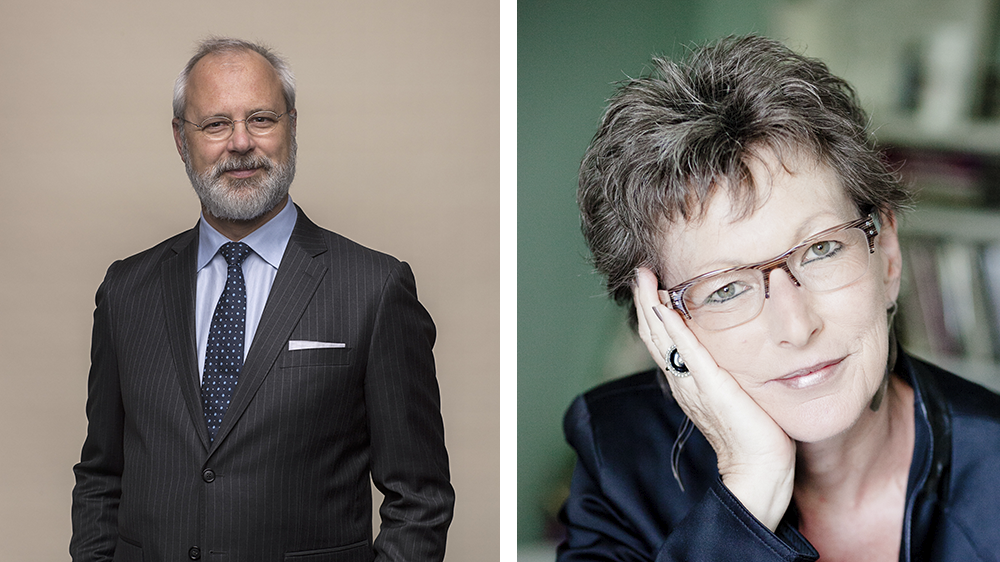Program
- 14.15-15: Johnny Herre holder forelesning med tittelen "Något om skillnaderna mellan att vara domare i Högsta domstolen och att vara skiljedomare i kommersiella tvister"
- 15-15.15: Pause
- 15.15-16: Nicola Lacey holder forelesning med tittelen "Criminal Justice and Social (In)justice"
Æresdoktorforelesningene er åpne for alle.
Om æresdoktorkandidatene
Johnny Herre har vært ved Högsta domstolen, Sveriges Høyesterett, siden 2010. Han har doktorgrad i juss fra Handelshögskolan, hvor han også har vært dosent og professor. Den akademiske karrieren har vært utgangspunkt for Herres arbeid i Högsta domstolen, men han har samtidig en solid praktisk tilnærming. Han er en av de fremste voldgiftsdommerne i Norden
Nicola Lacey er Professor of Law, Gender and Social Policy ved London School of Economics. Hun har gitt betydelige faglige bidrag til blant annet strafferett, likestillingsrett og rettsteori. Hennes mest kjente bok er A Life of H.L.A. Hart: The Nightmare and the Noble Dream, en biografi om den kjente britiske rettsteoretikeren H. L. A. Hart.
UiOs æresdoktorgrad gis til fremtredende, oftest utenlandske, akademikere. Den tildeles uten at kandidaten har forsvart en avhandling i disputas. UiO har hatt rett til å utnevne æresdoktorer siden 1824. De utnevnes som regel hvert tredje år ved UiOs årsfest i september.
Om forelesningene
Johnny Herre
Det finns sådant som förenar dömandet i en högsta domstol och i ett skiljeförfarande (voldgift). Att döma handlar alltid om att utifrån ett mer eller mindre ofullständigt underlag dra slutsatser om vem eller vilka av parterna som har rätt. Det finns dock många och väsentliga skillnader. I föreläsningen ges – efter 30 års erfarenhet av skiljeförfaranden och 12 år i Högsta domstolen i Sverige – några personliga reflektioner om dessa båda former av dömande. Ett antal av skillnaderna belyses närmare under rubrikerna arbetsformer och personsammansättning, tidsaspekter, processen, domsöverläggning och domskrivning.
Nicola Lacey
A recognition of the obstacles to achieving criminal justice in a society marked by structural injustice has been a longstanding feature of philosophical, legal and criminological literatures. Inequalities and injustices in social attitudes to certain groups and in the distribution of resources and opportunities in fields ranging from family life, education, health care, shelter and secure employment are perhaps the most obviously relevant features of a social order. Moreover the experience of abuse, prejudice, violence or nutritional or emotional deprivation is now understood to affect not simply economic and life opportunities but psychological and cognitive development. The consequent threat to the legitimacy of punishment is particularly acute when the state itself bears substantial responsibility for either creating, or failing to alleviate, the relevant conditions. Though the causal chains are complex, it is no exaggeration – nor is it inconsistent with a recognition of the role of individual agency – to speak of many injustices as criminogenic.
Meeting the challenge of doing a measure of criminal justice in these circumstances remains important, however, because of a further consideration, and one that complicates the moral and political challenge. This is the fact that disproportionalities in the impact of criminalisation and punishment on groups disadvantaged by injustice are matched by comparable disproportionalities in criminal victimisation. Economically marginalised groups and those subject to racism and other forms of prejudice find themselves not only on the sharp end of the criminal justice system, but also disproportionately the victims of crime. They also, all too often, face poor provision of criminal justice services such as policing.
In recent decades, this longstanding challenge has been exacerbated by emerging features of political economy in the so-called advanced democracies: notably the growth and embedding of economic inequalities. The increase in poverty and the emergence in many relatively wealthy countries of a polarised demographic featuring a substantial minority excluded from many of the benefits of economic growth, and even of political association, has both complicated the political challenge facing democratic governments, and significantly exacerbated the injustices which had long been apparent. In this paper, I analyse these developments, and consider their normative upshot and practical implications for the criminal justice, and their role in the re-emergence of new forms of criminal justice abolitionism.
